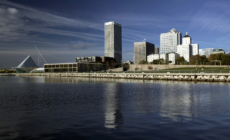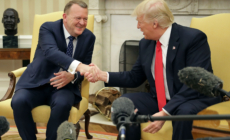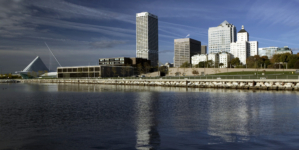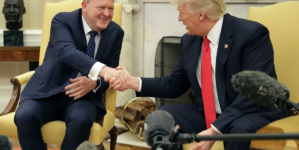-
The Year in News - 8 mins ago
-
Before Scopes, Clarence Darrow fought another battle. He was accused of bribing a jury - 24 mins ago
-
Teenagers Shot Dead on Christmas Day - 27 mins ago
-
Investigators Try to Determine Cause of Deadly Plane Crash in Kazakhstan - 52 mins ago
-
Fact Check: Did Denmark Offer to Buy United States? - about 1 hour ago
-
George McKenna and Jackie Goldberg, lions of LAUSD, retire after fiery careers - about 1 hour ago
-
Israel Loosened Its Rules to Bomb Hamas Fighters, Killing Many More Civilians - 2 hours ago
-
ESG Outlook in 2025: Despite Headwinds, No Retreat From Sustainability - 2 hours ago
-
Healthcare is Newsom’s biggest unfinished project. Trump complicates the task - 2 hours ago
-
Dead Body Found in Wheel Well of United Airlines Plane - 2 hours ago
Jeff Bezos Reveals Why Washington Post Didn’t Endorse A 2024 Candidate
Amazon CEO Jeff Bezos, the billionaire owner of The Washington Post, said in an op-ed published Monday that his newspaper did not endorse a political candidate in the 2024 election to help build trust with its readers.
Bezos said in his own editorial that the decision to not endorse a candidate was due to the dip in public trust in journalists and the media, adding that while newsrooms “must be accurate,” “we must be believed to be accurate.”
“Presidential endorsements do nothing to tip the scales of an election,” Bezos wrote. “No undecided voters in Pennsylvania are going to say, ‘I’m going with Newspaper A’s endorsement.’ None. What presidential endorsements actually do is create a perception of bias.”
“Ending them is a principled decision, and it’s the right one,” he added.
The editorial comes a few days after the Post’s publisher, William Lewis, wrote an op-ed announcing that the paper would not be endorsing either Vice President Kamala Harris nor former President Donald Trump in the 2024 race.
Lewis said the decision was a return “to our roots of not endorsing presidential candidates” and added that the paper would not be endorsing any candidates moving forward.
The decision sparked widespread backlash, including from the Post’s former executive editor, who described the choice as “cowardice,” “disturbing” and “spinelessness.”
An article was published by the Post hours after Lewis’ op-ed, saying that according to people familiar with the discussions, the paper’s editorial board was prepared to endorse Harris, but that Bezos — who has owned the paper since 2013 — blocked it from going out.

Photo by Drew Angerer/Getty Images
Bezos also dispelled accusations that either candidate “was consulted or informed at any level” about the Post’s decisions. Suspicions arose last week after it was reported that David Limp, the CEO of Bezos’ space company, Blue Origin, met with Trump in Austin, Texas, on Friday, the same day the paper announced it would not endorse a candidate.
“I sighed when I found out, because I knew it would provide ammunition to those who would like to frame this as anything other than a principled decision,” Bezos wrote of Trump and Limp’s meeting. “But the fact is, I didn’t know about the meeting beforehand. Even Limp didn’t know about it in advance; the meeting was scheduled quickly that morning.”
The Post’s outgoing editor-at-large, Robert Kagan, resigned from his position on Friday, and told The Daily Beast that Trump and Limp’s meeting was “proof of a backroom deal.” Twenty-one columnists at the Post have also signed a dissenting op-ed saying that it was “a terrible mistake” by the paper to not endorse a presidential candidate.
“Trump waited to make sure that Bezos did what he said he was going to do, and then met with the Blue Origin people,” Kagan said. “Which tells us that there was an actual deal made, meaning that Bezos communicated, or through his people, communicated directly with Trump, and they set up this quid pro quo.”
Bezos concluded in his op-ed, “While I do not and will not push my personal interest, I will also not allow this paper to stay on autopilot and fade into irrelevance–overtaken by unresearched podcasts and social media barbs—not without a fight…Now more than ever the world needs a credible, trusted, independent voice, and where better for that voice to originate than the capital city of the most important country in the world?”
Newsweek sent an email to the Post’s press relations team for further comment on Monday.
The Los Angeles Times also announced last week that it would not be endorsing a candidate this election after its billionaire owner, Patrick Soon-Shiong, blocked the paper’s editorial board from publishing its drafted endorsement of Harris.
The decision led to the Times’ editorials editor, Mariel Garza, to resign from her post. Two additional members of the paper’s editorial board resigned a day after Garza: Robert Greene and Karin Klein.
Soon-Shiong’s daughter said in a series of posts to social media last week that she was a part of her father’s decision to block Harris’ endorsement and blamed it on Israel’s “genocide” of Palestinians. The vice president has faced immense criticism from progressives over the White House’s policies toward Israel. The backlash could threaten Harris’ chances for victory in November, with some voters in key swing states like Michigan planning to vote third-party in protest.
Source link



















